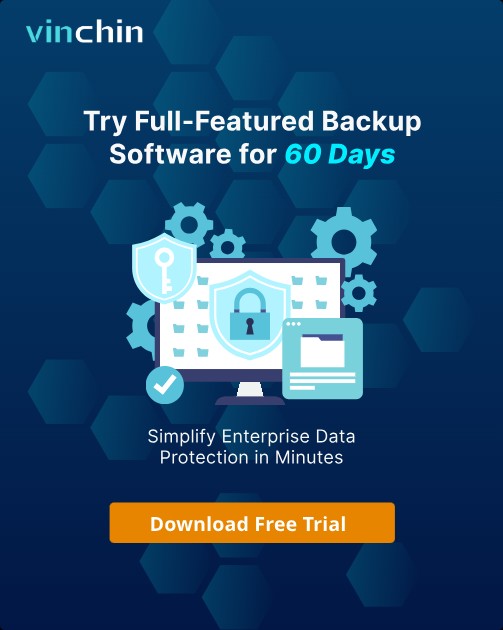-
5 Risks That Threaten InCloud Sphere Production Environment
-
Costs of Not Backing Up InCloud Sphere
-
InCloud Sphere Backup Checklist
-
The Best InCloud Sphere Backup Software: Vinchin Backup & Recovery
-
Best InCloud Sphere Backup Software FAQs
-
Conclusion
As more organizations move their core business systems to virtualized environments, the question “why backup InCloud Sphere” becomes vital. InCloud Sphere is a next-generation virtualization platform designed for enterprise private and edge clouds. It delivers high performance, scalability, and reliability for business workloads. But even the most advanced infrastructure is not immune to risk. For any business, data loss or downtime can mean lost revenue, compliance violations, or even reputational damage. That’s why robust backup is not just a technical task—it’s a business necessity.
5 Risks That Threaten InCloud Sphere Production Environment
Understanding the risks facing your InCloud Sphere environment is the first step to building a resilient IT strategy. Virtualization brings many benefits, but it also introduces new threats that can disrupt business operations.
Ransomware attacks are a growing concern for all organizations. Malicious software can encrypt or destroy virtual machines, making critical data and applications unavailable. Without a secure backup, recovery may be impossible.
Hardware failure remains a constant risk, even in virtualized environments. Disk crashes, power outages, or network failures can bring down entire clusters, leading to data loss or extended downtime.
Human error is another major threat. Accidental deletion of virtual machines, misconfiguration of resources, or improper updates can cause service interruptions or data corruption.
Insider threats, whether intentional or accidental, can compromise sensitive data or disrupt operations. Employees or contractors with access to management consoles may make unauthorized changes or leak information.
Compliance and regulatory issues are also significant. Many industries require strict data retention and protection policies. Failing to back up your InCloud Sphere environment can result in non-compliance, fines, or legal action.
Costs of Not Backing Up InCloud Sphere
Neglecting to back up your InCloud Sphere virtual machines exposes your business to permanent data loss, extended downtime, costly recovery efforts, regulatory penalties, and reputational harm. In real-world scenarios, a single ransomware attack or hardware failure can wipe out critical business data, forcing companies to halt operations for days or weeks. Without reliable backups, restoring lost information may be impossible, leading to lost revenue, customer trust, and even business closure. Regulatory bodies may impose fines for non-compliance, and customers may turn to competitors if they lose confidence in your ability to protect their data.
InCloud Sphere Backup Checklist
A robust backup strategy is essential for protecting virtual machines in any enterprise InCloud Sphere environment. Following a proven checklist helps ensure your data is safe, recoverable, and compliant.
Regularly scheduled backups is crucial. By setting up daily, weekly, or monthly backup jobs, you reduce the risk of human error and ensure that all critical data is protected without manual intervention.
Incremental and full backup options allow you to balance speed and storage use. Full backups capture the entire VM, while incremental backups only save changes since the last backup—saving time and space.
Deduplication and compression help optimize storage. By removing duplicate data and shrinking backup files you can store more restore points and reduce costs.
Granular restore capabilities are important for fast recovery. Instead of restoring an entire VM you can recover individual files or folders—minimizing downtime and disruption.
Backup verification and monitoring ensure reliability. Regularly testing backups and monitoring job status helps catch issues early so you can trust your backups will work when needed.
The Best InCloud Sphere Backup Software: Vinchin Backup & Recovery
To address these challenges effectively across diverse infrastructures like InCloud Sphere environments requires an advanced solution built for enterprises at scale—Vinchin Backup & Recovery fits this need precisely as it supports over 15 mainstream virtualization platforms including VMware Hyper-V Proxmox oVirt OLVM RHV XCP-ng XenServer OpenStack ZStack—and notably places strong emphasis on seamless integration with InCloud Sphere deployments.
Among its extensive feature set five stand out as especially relevant: incremental/full backups automated scheduling deduplication/compression granular restore capabilities plus comprehensive backup verification—all working together to maximize efficiency minimize storage consumption accelerate recovery times maintain compliance standards while ensuring operational continuity.
Using Vinchin Backup & Recovery's intuitive web console makes safeguarding VMs straightforward:
Step 1: Select the InCloud Sphere VM you wish to back up;
Step 2: Choose appropriate backup storage;
Step 3: Configure tailored backup strategy;
Step 4: Simply submit the job, automating protection from that point forward.
Recognized globally by thousands of enterprises with top industry ratings Vinchin Backup & Recovery offers a 60-day fully featured free trial—click download now for trusted enterprise-grade protection!
Best InCloud Sphere Backup Software FAQs
Q1: Why is it important to back up InCloud Sphere virtual machines?
A1: Backups protect against data loss from ransomware hardware failure or human error ensuring business continuity.
Q2: Can I restore individual files from an InCloud Sphere VM backup?
A2: Yes granular restore lets you recover specific files or folders without restoring the entire VM.
Q3: How often should I schedule backups for InCloud Sphere?
A3: Best practice is to automate daily or weekly backups to minimize data loss and reduce manual workload.
Q4: Does backup software for InCloud Sphere support data deduplication?
A4: Yes deduplication reduces storage needs by eliminating duplicate data in backup files.
Q5: What happens if a backup job fails in InCloud Sphere?
A5: Monitoring/verification features alert you so issues are resolved before risking any loss.
Q6: Is it possible to test backup reliability in InCloud Sphere environments?
A6: Yes regular backup verification ensures your data can be restored when needed.
Conclusion
Reliable backup is essential for any enterprise using InCloud Sphere to protect against data loss downtime and compliance risks. Vinchin Backup & Recovery delivers the advanced features and ease of use needed to safeguard your virtualized business environment.
Share on:






